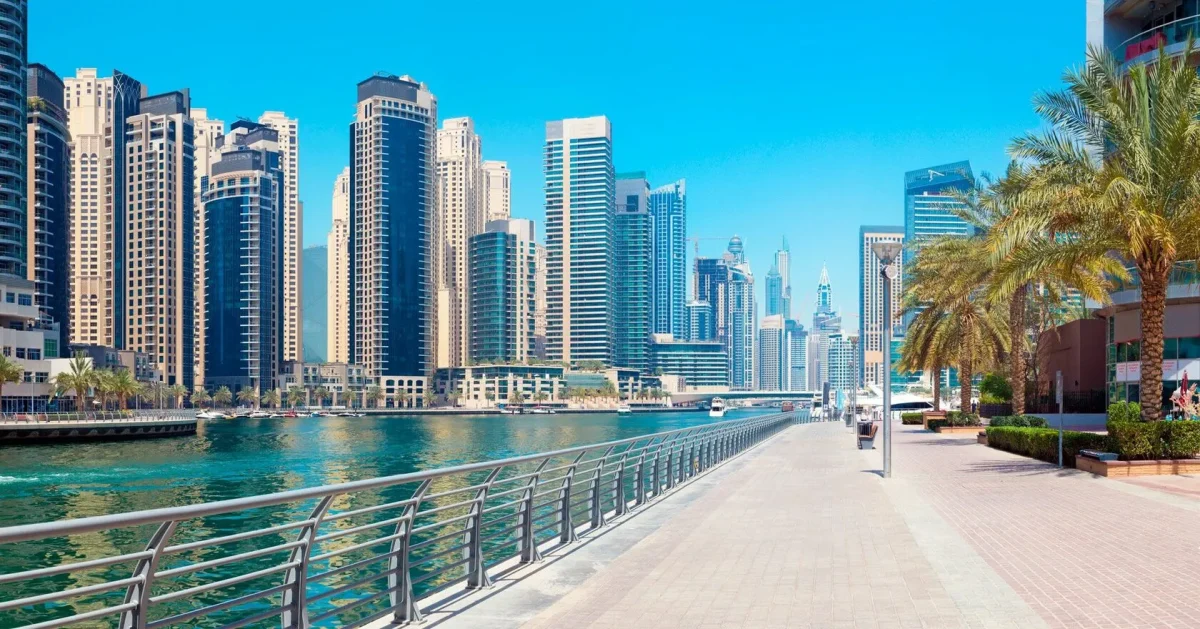
Dubai Real Estate: Tax-Free Paradise for Dutch Investors
- Legal Particulars for Dutch Investors to Consider
- What Are Dubai’s Freehold Areas Where Dutch Citizens Can Buy Properties?
- How to Proceed with a Real Estate Purchase in Dubai
Numerous 2023 and 2024 reports confirm that Dutch nationals are among the top nationalities investing in Dubai’s real estate market alongside other Europeans. But why is this the case?
The main standout feature of Dubai’s property landscape is investor-friendly taxation—especially if we compare it with the Dutch tax system.
First, Dubai has no fictitious return on capital, a concept widely criticized in the Netherlands. Second, Dubai has no income or capital gains taxes and no property taxes whatsoever (no OZB taxes, you got it!).
Third, the UAE and the Netherlands have a Double Taxation Avoidance Agreement (DTAA) to prevent double taxation and promote economic cooperation between the two countries. The DTAA primarily affects how the Netherlands treats dividends or other income brought back from Dubai, since most Dubai businesses don’t pay corporate taxes on profits (except oil companies).
If a Dutch national maintains their residence outside of the Netherlands and doesn’t repatriate funds, the profits earned in Dubai may avoid Dutch taxation. Consulting with a tax expert or a lawyer is recommended to ensure compliance with Dutch tax laws.
With high rental yields (7-9%) compared to many European cities and an attractive return on investment (ROI) compared to the Netherlands, Dubai is a terrific option for passive income or second-home investment.
Legal Particulars for Dutch Investors to Consider
Dutch investors can own properties in Dubai or other UAE emirates outright without local partners.
As we have already mentioned, there are no recurring annual taxes levied on property ownership. Only a one-time registration fee of 4% of the purchase price applies when buying a property.
Dutch citizens can buy various types of properties in Dubai in its freehold areas, which include Downtown Dubai, Dubai Marina, Palm Jumeirah, and a dozen others.
Dutch nationals can obtain long-term residency visas linked to property ownership in Dubai.
In the Netherlands, recent legislation like the Affordable Rent Act has imposed stricter controls on rental prices, which will affect investor returns. Tax pressures are also increasing with changes to Box 3 taxation rules from 2025. Dubai, on the flip side, has no similar regulatory barriers to rental prices.
To complete a purchase in Dubai, no notary involvement is required. However, engaging with real estate agents is essential (more about this below).
Dubai’s new constructions offer lucrative options for foreign buyers. Various attractive interest-free installment options are available, even if you are a non-resident.
What Are Dubai’s Freehold Areas Where Dutch Citizens Can Buy Properties?
Whether you are looking for an apartment, villa, or townhouse, each residential development will come packed with luxury amenities. So, we’d advise Dutch nationals considering purchasing property in Dubai to extend their search beyond seaside neighborhoods. But of course, Dubai’s beach residences are premier choices.
Here are five Dubai neighborhoods with high demand, both rental and sales, attracting a diverse range of residents and investors.
Jumeirah Village Circle (JVC)
A popular choice for families and young professionals due to its affordability and community feel.
With property prices starting from €123,687 and reaching up to €582,724 for a 138-square-meter three-bedroom apartment, JVC is a hot ticket to diversify an investor’s portfolio.
JVC’s developers are offering incentives for customers with installment plans. With a 10% down payment, you can buy an apartment in Elitz 2, which will be handed over in 2026. If you need a development that will be completed sooner, consider V1ter Residence with a 20% down payment and a completion date in 2025.
Palm Jumeirah
It’s hard to describe this neighborhood in words. Better Google the pictures—they say it all. The ongoing development of new entertainment and leisure attractions further enhances its appeal.
You may think local real estate prices are beyond your budget. However, here is a quick breakdown to clarify your doubts: A spacious one-bedroom apartment in The Palm Beach Tower 3 can cost you €1,059,424. More upscale properties, such as five-bedroom units in Como Residences, reach €11,077,583.
Damac Lagoons
Part of the extensive Dubailand area, the Damac Lagoons project is on the brink of outshining other neighborhoods in luxury developments and amenities. Its unique draw is the concept of themed “cities” within the community.
The two most prominent developments are Nice and Portofino. Both will be completed in 2025 and feature standalone villas and townhouses with prices starting from €403,992.
Downtown
Dubai’s central district is the city’s calling card. Within a five-minute walk, you can reach one attraction or the other of your sightseeing list. Who wouldn’t enjoy that? However, Dutch investors should move fast: there is limited availability of new land for development in this area.
The neighborhood is especially fitting for short-term renting if you invest in a development under construction. Studios in Society House, for instance, start from just €365,160. Another renowned developer offers one-bedroom apartments at Elegance Tower Damac with prices from €561,785.
Business Bay
Another bustling neighborhood with glassy skyscrapers and mesmerizing water promenades. In just five minutes, you can park by Burj Khalifa and Dubai Mall. The number of local companies, by the way, is on the rise: more and more businesses are setting up offices in the area.
For affluent buyers, Burj Binghatti Jacob&Co Residences offers six-bedroom apartments priced at €7,941,597. Whereas prices at Vela Dorchester Collection start from €11,064,647 for a three-bedroom apartment and reach €58,732,069 for an expansive five-bedroom unit.
How to Proceed with a Real Estate Purchase in Dubai
- Identify the property type and desired neighborhood based on factors like proximity to airports and business clusters, infrastructure, or lifestyle preferences.
- Engage with a reputable real estate agent who understands Dubai’s market. Why is this important?
- Real estate agents in Dubai are licensed by the Dubai Land Department (DLD) to operate legally, and you can inquire about their licenses before hiring.
- Dubai’s fast-paced environment requires legal expertise from agents. That is why they play crucial roles in navigating complex transactions and ensuring compliance with DLD standards.
- Agents facilitate transactions between buyers and sellers and offer market insights and support throughout the transaction process.
At Top Address, all real estate agents are licensed experts with hands-on experience completing property sales and purchases for European clients.
- Inspect potential properties if you prefer buying pre-owned housing. You can also ask for a tour of a completed development by a developer in whose off-plan project you are interested. If you work with our agency, you can complete this step remotely, as our agents can film video tours for you on request.
- Work with your agent to negotiate the terms of the sales and purchase agreement (SPA) once you have selected an apartment or house to buy.
- Obtain a No Objection Certificate from the developer and sign a Memorandum of Understanding, a preliminary agreement outlining conditions such as price and installment payment schedule.
- Complete registration at DLD by paying the right transfer fee. Quite often, these 4% are split between the buyer and seller. However, individual exceptions may apply.
Note that in Dubai, there is no transfer tax (overdrachtsbelasting) when purchasing properties.
If you are eligible for residency visa programs, such as three-year renewable visas or ten-year Golden Visas, consult with an agent on applying. You are also free to study online guides and submit your papers independently.
What to Be Aware of As a Dutch National Buying Property in Dubai
In case you decide to complete the purchase without the assistance of a reputable agent who has experience handling international transactions, you will have to understand local laws and market trends and conduct due diligence yourself.
- Familiarize yourself with UAE laws regarding foreign ownership rights, especially if you buy pre-owned real estate.
- Stay informed about market fluctuations that could impact your investment returns. However, we should note that Dubai’s economic health is more stable and robust than that of the Netherlands because the Dutch economy is closely tied to Europe and can be affected by European economic fluctuations.
- Verify all documents related to the developer’s or seller’s ownership rights and ensure compliance with regulatory requirements.
- Before signing the SPA with the seller, consider discussing maintenance fees and service charges that cover communal facilities. Overall, the Netherlands has higher utility and renovation expenses than the UAE, but considering those in advance will prevent any unexpected financial burdens.
Dubai has lower average utility bills and annual repair costs compared to Europe because the climate is warmer here, energy is cheaper, and less insulation is required. Besides, the Netherlands has higher repair costs due to stricter regulations.
For more detailed advice tailored specifically to your situation, please consult our professional advisors who specialize in cross-border investments!


